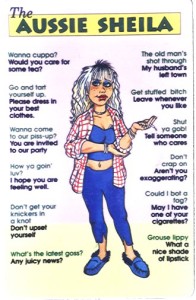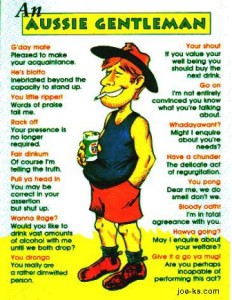PTE|Melbourne English|How it differs from what we call English
提供备考捷径,避免走弯路!

Australia has three recognised accents. About ten per cent of Australians speak like ex-prime minister Bob Hawke with what is known as a broad Australian accent. The broad Australian accent is usually spoken by men. 80 per cent speak like Nicole Kidman with a general Australian accent. 10 per cent speak like ex Prime Minister Malcolm Fraser with British received pronunciation or cultivated English. Although some men use the pronunciation, the majority of Australians that speak with the accent are women. It is a myth that working class Australians use cockney like David Beckam. It is a myth that Queenslanders speak differently to South Australians. It is also a myth that children of migrants have distinct accents.

The gender difference in pronunciation can perhaps be attributed to differing expectations about gender identities that are relatively favourable to the Australian male stereotype but unfavourable to the Australian female stereotype. Specifically, expectations that men should be unpretentious, laid back and friendly are relatively consistent with stereotypes of Australian men. Contrasted to men, expectations that women should be refined, proper and neat are relatively inconsistent with stereotypes of Australian women. As a result, arguably more Australian men are comfortable adopting the accent of the Australian stereotype than are Australian women.

Spelling
In regards to spelling, Australia uses a mix of American and British spelt words. As a general rule, words less than five letters tend to be spelt in the British style while those over five letters are more likely to be American. Some of the politics involved were illustrated in the spelling of labour. The Australian Labor Party adopted American spelling in the early 20th century in order to associate itself with American libertarian ideals. While using American spelling for the Labor Party is acceptable, British spelling for the act of labour is expected due to fears of an American cultural colonisation of Australia. American spelling for words like “organization” is more common than British “organisation”, probably because it makes more sense to spell a z sound with the letter z and words over 5 letters are too complicated for some Australians to worry about where it came from.
Grammar
Like spelling, Australian grammar is a mix of British and American English. In Britain, collective nouns are usually defined as plural. For example, the British would say, “The couple are happy.” American grammar is more pattern orientated so a noun is defined as plural when it has an s. For example, Americans would say, “The couple is happy” (singular) but “The two cowboys are happy.” In Australia, there isn’t sufficient knowledge of grammar to reject either British or American tradition so both have become standard as a result of American television and American computer grammar checks mixing with traditional British instruction.
Australian idioms
A shitshow – (disaster)
Bee’s dick of a chance (no chance)
Didn’t come down in the last shower (clever)
A dog’s breakfast (mess)
Australian similes
As mad as a gum tree full of galahs (crazy)
As a mad a cut snake (crazy)
Built like a brick shithouse (muscular)
As dry as a dead dingoe’s donga (thirsty)
Rhetorical sayings
Is a duck’s arse water tight?
Words unique to Australia
Bludger – (Lazy person riding off someone else’s hard work. Derived from bludgeoner; a prostitutes standover man)
Wowser – (Someone who mistakes the world as a penitentiary and themselves as the warden.)
Larrikin – (Iconic individual that sails close to the wind in regards to rules. Initially used in reference to street criminals)
